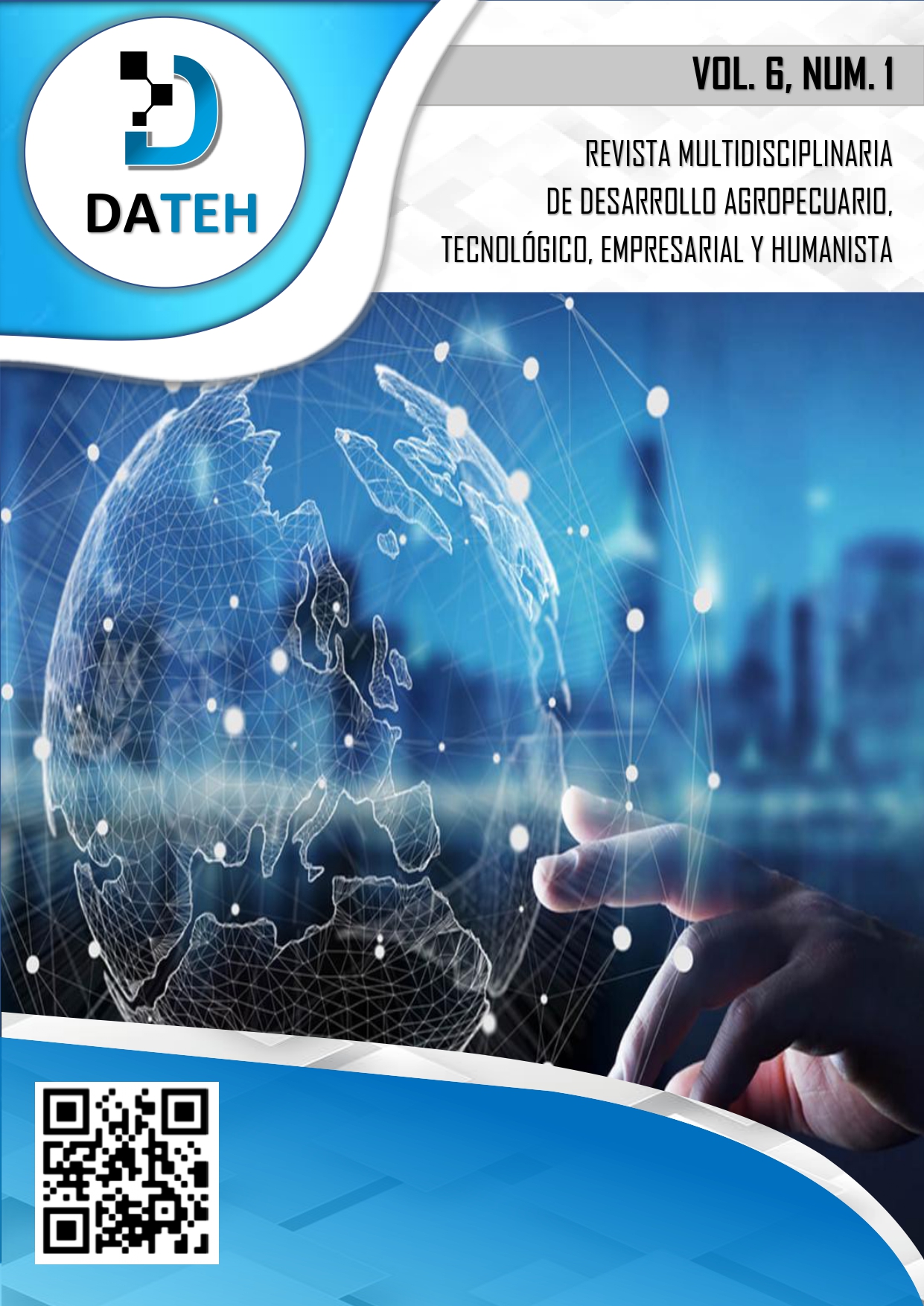Generation of CO2 emissions from the Ecuadorian manufacturing industry, a path to sustainability
Abstract
The industrial manufacturing sector in Ecuador promotes the development and economic growth of the country; however, its industrial processes generate environmental impacts on the environment such as water pollution, waste generation, energy consumption, and CO2 emissions, the latter being the subject of this study. In this research, the current expenditure and investment made by manufacturing industries to prevent CO2 emissions generated by the consumption of fuels and liquid lubricants in industrial processes was analyzed. The degree of correlation and the incidence between the variables under study were determined by applying multiple linear regression models. For the analysis we used the database obtained from the National Institute of Statistics and Census (INEC), corresponding to the environmental module: ENESEM (Business Structural Survey) for the year 2020. The results obtained show that 37.7% of the companies spent current expenses on environmental activities to prevent emissions or pollutant concentrations in the air, while 2.8% of the total number of industries made environmental investments; therefore, it is important that companies apply environmental protection strategies to prevent the effects caused by production processes. The fuels that generated the greatest amount of CO2 emissions are waste fuel oil, coal, and natural gas, which are used mainly in boilers, transportation, direct heat, motive power, and refrigeration.
Downloads
References
Bhatt, H., Davawala, M., Joshi, T., Shah, M., & Unnarkat, A. (2023). Forecasting and mitigation of global environmental carbon dioxide emission using machine learning techniques. Cleaner Chemical Engineering, 5, 1-9. https://doi.org/10.1016/j.clce.2023.100095
Bórquez Polloni, B., & Lopicich Catalán, B. (2017). La dimensión bioética de los objetivos de desarrollo sostenible (ODS). Bioética y Derecho, 41, 121-139. https://www.redalyc.org/journal/783/78354511009/78354511009.pdf
Dominguez Manjarrez, C. A., Bravo Álvarez, H., & Sosa-Echeverría, R. (2014). Prevención, minimización y control de la contaminación ambiental en un ingenio azucarero de México. Ingeniería, Investigación y Tecnología, 15(4), 549-560. https://doi.org/10.1016/s1405-7743(14)70653-5
Elsabbagh, A. (2023). Materials development in transportation industry: Fuel consumption, safety and recycling. Ain Shams Engineering Journal, 14, 1-10. https://doi.org/10.1016/j.asej.2022.102096
Fan, W., Yan, L., Chen, B., Ding, W., & Wang, P. (2022). Environmental governance effects of local environmental protection expenditure in China. Resources Policy, 77, 1-11. https://doi.org/10.1016/j.resourpol.2022.102760
Feng, Y., Xiao, Z., Zhou, J., & Ni, G. (2023). Asymmetrically examining the impact of green finance and renewable energy consumption on environmental degradation and renewable energy investment: The impact of the COVID-19 outbreak on the Chinese economy. Energy Reports, 9, 5458-5472. https://doi.org/10.1016/j.egyr.2023.04.361
González Acolt, R., Castillo Rodríguez, J., & Ivanova Boncheva, A. (2019). Prácticas ambientales en empresas manufactureras de equipo de transporte en México. Venezolana de Gerencia, 2, 210-218. https://doi.org/10.37960/revista.v24i2.31489
Guevara, I., Pérez, J. M., & Bravo, B. (2023). Impacto de los objetivos de desarrollo sostenible en la investigación educativa sobre educación ambiental. Revista Eureka sobre Enseñanza y Divulgación de las Ciencias, 20(2), 250101-250117. https://www.redalyc.org/articulo.oa?id=92073956009
Guillén, J., Calle, J., Gavidia, A. M., & Vélez, A. G. (2020). Desarrollo sostenible : Desde la mirada de preservación del medio ambiente colombiano. Ciencias Sociales, 26(4), 293-305. https://www.redalyc.org/journal/280/28065077023/28065077023.pdf
Gutiérrez Escajeda, M. T., Medellin Milán, P., Ávila Galarza, A., Morales Aguilar, J. S., & Chavira Martínez, M. A. (2019). Contribución de los subsectores manufactureros en la variación de las emisiones de CO2 por el uso de combustible en San Luis Potosí, México. Acta Universitaria, 29, 1-14. https://doi.org/10.15174/au.2019.1920
INEC. (2020). Información Ambiental Económica en Empresas – 2020. https://www.ecuadorencifras.gob.ec/informacion-ambiental-economica-en-empresas-2020/
INEC. (2022). Módulo de información económica ambiental de empresas. https://www.ecuadorencifras.gob.ec/documentos/web-inec/Encuestas_Ambientales/EMPRESAS/Empresas%1F_2020/PRES_MOD_AMB_EMP_2020_Vf.pdf
Korku, E., & Tregenna, F. (2022). Greening manufacturing: Technology intensity and carbon dioxide emissions in developing countries. Applied Energy, 324, 1-12. https://doi.org/10.1016/j.apenergy.2022.119726
Lovato Torres, S. G., Hidalgo Hidalgo, W. A., Fienco Valencia, G. V., & Buñay Cantos, J. P. (2019). Incidencia del crecimiento económico del sector manufacturero sobre el Producto Interno Bruto en Ecuador. Venezolana de Gerencia, 24(86), 563-573. https://www.redalyc.org/journal/290/29059356014/29059356014.pdf
Parra Cortés, R. (2018). La Agenda 2030 y sus objetivos de desarrollo sostenible: antecedentes y perspectivas para promover el consumo y la producción sostenibles en Chile. Derecho Ambiental, 6(10), 99-121. https://doi.org/https://doi.org/10.5354/0719-4633.2018.52077
Pérez Darquea, D. G. (2018). Estudio de emisiones contaminantes utilizando combustibles locales. INNOVA Research Journal, 3(3), 23-34. https://doi.org/10.33890/innova.v3.n3.2018.635
Rahko, J. (2023). The effects of environmental investments on the economic performance of industrial plants – Evidence from Finland. Cleaner Production, 1-11. https://doi.org/10.1016/j.jclepro.2023.136142
Raihan, A. (2023). The dynamic nexus between economic growth, renewable energy use, urbanization, industrialization, tourism, agricultural productivity, forest area, and carbon dioxide emissions in the Philippines. Energy Nexus, 9. https://doi.org/10.1016/j.nexus.2023.100180
Saavedra, M. L., Tapia, B., & Aguilar, M. de los Á. (2023). La gestión ambiental en la pyme de la ciudad de México. Ciencias administrativas, 11(22). https://doi.org/https://doi.org/10.24215/23143738e120
Tian, J. F., Pan, C., Xue, R., Yang, X. T., Wang, C., Ji, X. Z., & Shan, Y. L. (2020). Corporate innovation and environmental investment: The moderating role of institutional environment. Advances in Climate Change Research, 11(2), 85-91. https://doi.org/10.1016/j.accre.2020.05.003
Vilá Baños, R., Torrado Fonseca, M., & Reguant Álvarez, M. (2019). Análisis de regresión lineal múltiple con SPSS: un ejemplo práctico. REIRE Revista d Innovació i Recerca en Educació, 12(2), 1-10. https://doi.org/10.1344/reire2019.12.222704



